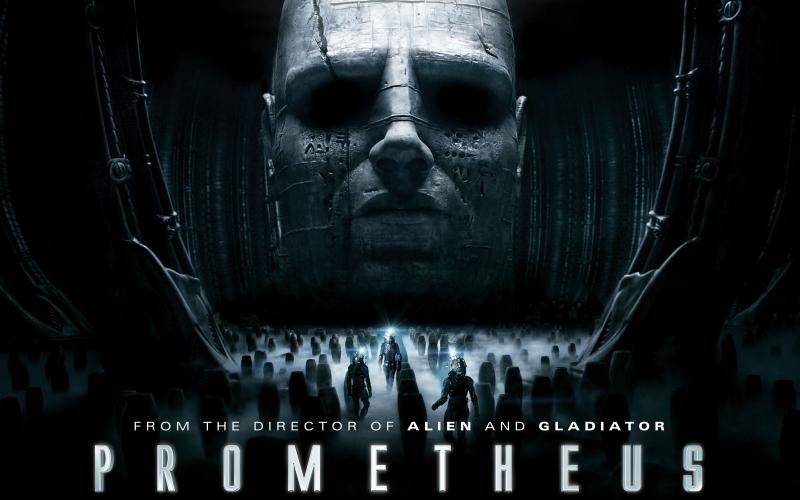Prometheus (2012)

Prometheus (2012), directed by Ridley Scott, is a thought-provoking science fiction film that explores themes of creation, existence, and the limits of human understanding. Set in the same universe as Scott’s 1979 classic Alien, Prometheus serves as both a prequel and a standalone exploration of the origins of life and the quest for knowledge. With a stellar cast including Noomi Rapace, Michael Fassbender, and Charlize Theron, the film presents a complex narrative and a visually stunning depiction of its speculative ideas.
Prometheus begins in the late 21st century with the discovery of ancient star maps by archaeologists Elizabeth Shaw (Noomi Rapace) and Charlie Holloway (Logan Marshall-Green). These maps point to a distant moon, LV-223, suggesting a connection between the ancient human race and a mysterious extraterrestrial species known as the Engineers. Driven by the desire to understand the origins of humanity, the Weyland Corporation funds an expedition aboard the spaceship Prometheus to explore the moon.
Upon arriving at LV-223, the crew discovers an ancient and abandoned alien facility. The team soon finds evidence of the Engineers’ advanced technology and their potential role in the creation of human life. As they investigate further, they encounter a series of unsettling discoveries, including a deadly biological threat that puts their lives in jeopardy. The crew’s quest for answers takes a darker turn as they uncover the true nature of the Engineers’ intentions and face existential questions about their own existence.

One of the central themes of Prometheus is the concept of creation and the quest to understand the origins of life. The film explores the idea that humanity’s existence may be the result of extraterrestrial intervention, challenging the notion of human exceptionalism and raising questions about the nature of creation itself. The Engineers’ role as creators of life on Earth mirrors humanity’s own desire to explore and understand its origins, reflecting a fundamental quest for meaning.
The film also delves into the philosophical implications of playing god and the consequences of seeking answers that may not be meant to be found. The characters’ encounters with the Engineers’ technology and their eventual discovery of the Engineers’ true motives highlight the dangers inherent in challenging the unknown and the ethical dilemmas associated with creating life.
The performances in Prometheus are integral to its exploration of complex themes. Noomi Rapace delivers a compelling portrayal of Elizabeth Shaw, a scientist driven by a deep-seated belief in the search for truth and the origins of humanity. Rapace’s performance captures Shaw’s determination and vulnerability as she grapples with the existential implications of their discoveries.

Michael Fassbender’s portrayal of David, an android with his own agenda, is one of the film’s standout performances. Fassbender brings a chilling and enigmatic quality to the character, reflecting David’s curiosity, intelligence, and underlying motives. His interactions with the human crew and his quest for understanding underscore the film’s exploration of artificial intelligence and the ethical considerations of creating sentient beings.
Charlize Theron’s role as Meredith Vickers, the Weyland Corporation representative, adds a layer of complexity to the film’s exploration of corporate interests and personal motivations. Theron’s performance reflects Vickers’ ambition and pragmatism, contributing to the film’s exploration of the interplay between human desires and corporate agendas.
Ridley Scott’s direction of Prometheus is marked by its visual grandeur and thematic depth. Scott’s use of practical effects, combined with CGI, creates a visually stunning and immersive experience. The depiction of the alien environment, the derelict space vessel, and the Engineers’ technology is both impressive and haunting, contributing to the film’s sense of wonder and dread.
The cinematography, by Dariusz Wolski, enhances the film’s atmosphere and visual impact. The use of wide shots and detailed close-ups captures the scale and intricacy of the alien landscapes and technology, while also focusing on the characters’ emotional and psychological states. The film’s visual style complements its thematic concerns, creating a sense of both awe and unease.
The musical score by Marc Streitenfeld adds to the film’s emotional and dramatic tension. The score’s use of orchestral and ambient elements underscores the film’s exploration of existential themes and enhances the sense of foreboding and mystery.

Prometheus received a mixed reception from critics and audiences. The film was praised for its ambitious narrative, visual effects, and thought-provoking themes, with many appreciating its attempt to explore deep philosophical questions within the science fiction genre. The film’s visual and technical achievements were also noted for their contribution to the genre.
However, some critics and viewers found the film’s narrative to be convoluted and its exploration of certain themes to be ambiguous. The film’s connection to the Alien franchise was also a point of contention, with some fans feeling that it did not fully deliver on the expectations set by its predecessor.
Despite these mixed reviews, Prometheus has been recognized for its ambitious approach and its contribution to discussions about creation, existence, and the search for meaning. The film’s influence is evident in its impact on the science fiction genre and its role in expanding the universe established by Ridley Scott’s earlier work.
Prometheus (2012) is a visually stunning and thematically complex film that explores the profound questions of creation and existence. Ridley Scott’s direction, combined with strong performances and innovative cinematic techniques, creates an engaging and thought-provoking experience. While the film’s reception has been mixed, its contribution to the science fiction genre and its exploration of deep philosophical questions make it a significant and impactful entry in Ridley Scott’s filmography.









